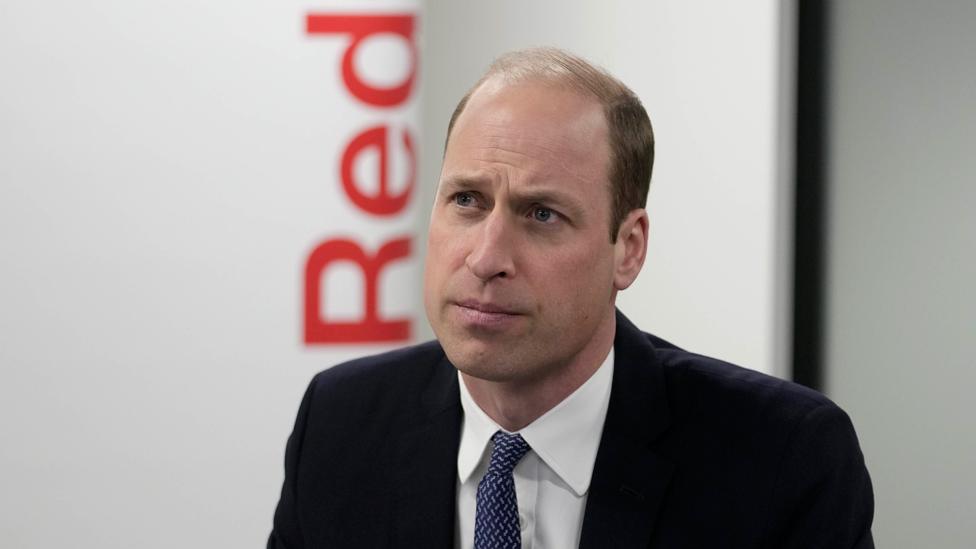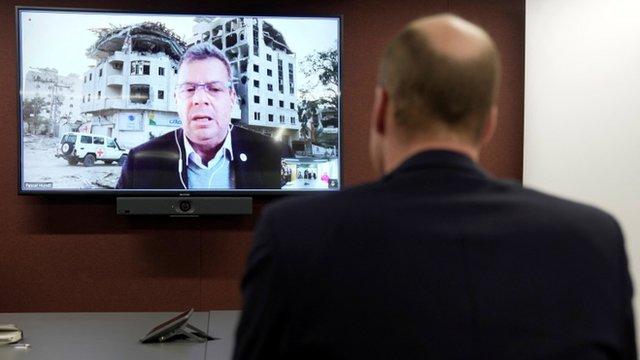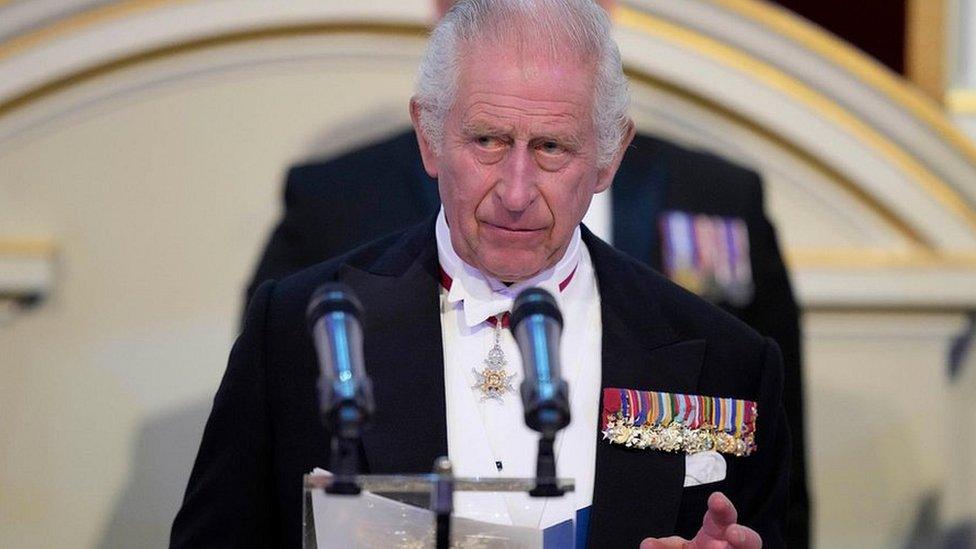Prince William: 'Too many killed' in Israel-Gaza war
- Published

Prince William has called for an "end to the fighting as soon as possible", in a strongly worded intervention on the Israel-Gaza conflict.
He has spoken of the "terrible human cost of the conflict in the Middle East since the Hamas terrorist attack".
The Prince of Wales says there is a "desperate need for increased humanitarian support to Gaza" and for hostages to be released.
His statement came as he visited the British Red Cross in London.
It's understood the government had been briefed about the prince's statement and his visits, via the Foreign, Commonwealth and Development Office.

Prince William took part in a video link with Red Cross staff working in Gaza
"Too many have been killed," said the prince, who was told by Red Cross workers about the humanitarian efforts to support people caught up in the conflict in the Middle East.
He took part in a video link with Red Cross staff in Gaza, who gave him graphic first-hand accounts of their work.
The prince heard warnings from senior crisis manager, Pascal Hundt, that without medical supplies or fuel, hospitals risked "becoming a cemetery" and that distributing humanitarian aid had become difficult because of looting by "hungry mobs".
Prince William was also told that the Red Cross was ready to help with the release of hostages.
"It is civilians who pay the price as the humanitarian situation continues to deteriorate," said Beatrice Butsana-Sita, British Red Cross chief executive.
Israel launched its operations in Gaza following an attack by Hamas on southern Israel on 7 October, during which about 1,200 people were killed and more than 240 others taken hostage.
The Israeli military campaign has killed 29,000 people in the Palestinian territory, according to the Hamas-run health ministry.
Prince William is carrying out visits this month intended to recognise the human suffering and distress from the Israel-Gaza war.
He is said to have felt strongly about what has happened in the Middle East and is "deeply moved as a father".
"Sometimes it is only when faced with the sheer scale of human suffering that the importance of permanent peace is brought home," says the prince.
The prince's statement was welcomed by Prime Minister Rishi Sunak, whose spokeswoman said: "We want to see an end to the fighting in Gaza as soon as possible, so it is consistent with the government position."
On another visit to a synagogue later this month Prince William will speak to young people from a range of backgrounds, in a meeting which will draw particular attention to concerns about antisemitism.
In response to the prince, Israeli government spokesman Eylon Levy said: "Israelis of course want to see an end to the fighting as soon as possible, and that will be possible once the 134 hostages are released, and once the Hamas terror army threatening to repeat the 7 October atrocities is dismantled."
Britain's chief Rabbi Ephraim Mirvis said Prince William had shown "deep concern" for the wellbeing of all those affected by the conflict and said his visit to a synagogue would "send a powerful message".
The building of bridges between faiths, and tackling religious intolerance, has been a particular cause of the prince's father, King Charles III.
But since the King's cancer diagnosis earlier this month, he has not been carrying out such public visits.
Last October, the King spoke of the "heartbreaking loss of life" in the Middle East conflict and made an impassioned call for respect between different faiths and cultures.
And in his Christmas message, he spoke of the underlying universal values shared by religions, at a time of "tragic conflict".
But with the King stepping back from such public involvement during his cancer treatment, Prince William will be among the senior royals taking on such symbolic and sensitive visits.
Prince William's full statement reads:
"I remain deeply concerned about the terrible human cost of the conflict in the Middle East since the Hamas terrorist attack on October 7. Too many have been killed.
"I, like so many others, want to see an end to the fighting as soon as possible. There is a desperate need for increased humanitarian support to Gaza. It's critical that aid gets in and the hostages are released.
"Sometimes it is only when faced with the sheer scale of human suffering that the importance of permanent peace is brought home.
"Even in the darkest hour, we must not succumb to the counsel of despair. I continue to cling to the hope that a brighter future can be found and I refuse to give up on that."
- Published18 October 2023
